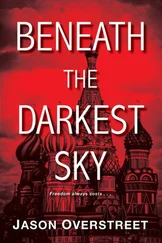“Oui,” said Tunner again; he was sitting forward in his chair, his hands on his knees, looking very serious.
“Ah, yes,” yawned his host, rising to throw more wood on the fire. “A surprising people, the Arabs. Of course here there’s a very heavy admixture of Soudanese, from the time of slavery—”
Tunner interrupted him. “But you say they’re not in El Ga’a now?”
“Your friends? No. They’ve gone to Sba, as I told you. The Chef de Poste there is Captain Broussard; he is the one who telegraphed me about the typhoid. You’ll find him a bit curt, but he’s a fine man. Only the Sahara does not agree with him. Some it does, some not. Me, for example, I’m in my element here.”
Again Tunner interrupted. “How soon do you think I can be in Sba?”
The lieutenant laughed indulgently. “Vous êtes bien pressi! But there’s no hurry with typhoid. It will be several weeks before your friend will care whether he sees you or not. And he will not be needing that passport in the meantime! So you can take your time.” He felt warmly toward this American, whom he found much more to his liking than the first. The first had been furtive, had made him vaguely uneasy (but perhaps that impression had been due to his own state of mind at the time). In any case, in spite of Tunner’s obvious haste to leave Bou Noura, he found him a sympathetic companion, and he hoped to persuade him to stay a while.
“You will remain for dinner?” said the lieutenant.
“Oh,” said Tunner distraughtly. “Thank you very much.”
First of all there was the room. Nothing could change the hard little shell of its existence, its white plaster walls and its faintly arched ceiling, its concrete floor and its windows across which a sheet had been tacked, folded over many times to keep out the light. Nothing could change it because that was all there was of it, that and the mattress on which he lay. When from time to time a gust of clarity swept down upon him, and he opened his eyes and saw what was really there, and knew where he really was, he fixed the walls, the ceiling and the floor in his memory, so that he could find his way back next time. For there were so many other parts of the world, so many other moments in time to be visited; he never was certain that the way back would really be there. Counting was impossible. How many hours he had been like this, lying on the burning mattress, how many times he had seen Kit stretched out on the floor nearby, had made a sound and seen her turn over, get up and then come toward him to give him water—things like that he could not have told, even if he had thought to ask them of himself. His mind was occupied with very different problems. Sometimes he spoke aloud, but it was not satisfying; it seemed rather to hold back the natural development of the ideas. They flowed out through his mouth, and he was never sure whether they had been resolved in the right words. Words were much more alive and more difficult to handle, now; so much so that Kit did not seem to understand them when he used them. They slipped into his head like the wind blowing into a room, and extinguished the frail flame of an idea forming there in the dark. Less and less he used them in his thinking. The process became more mobile; he followed the course of thoughts because he was tied on behind. Often the way was vertiginous, but he could not let go. There was no repetition in the landscape; it was always new territory and the peril increased constantly. Slowly, pitilessly, the number of dimensions was lessening. There were fewer directions in which to move. It was not a clear process, there was nothing definite about it so that he could say: “Now up is gone.” Yet he had witnessed occasions when two different dimensions had deliberately, spitefully, merged their identities, as if to say to him: “Try and tell which is which.” His reaction was always the same: a sensation in which the outer parts of his being rushed inward for protection, the same movement one sometimes sees in a kaleidoscope on turning it very slowly, when the parts of the design fall headlong into the center. But the center! Sometimes it was gigantic, painful, raw and false, it extended from one side of creation to the other, there was no telling where it was; it was everywhere. And sometimes it would disappear, and the other center, the true one, the tiny burning black point, would be there in its place, unmoving and impossibly sharp, hard and distant. And each center he called “That.” He knew one from the other, and which was the true, because when for a few minutes sometimes he actually came back to the room and saw it, and saw Kit, and said to himself—“I am in Sba,” he could remember the two centers and distinguish between them, even though he hated them both, and he knew that the one which was only there was the true one, while the other was wrong, wrong, wrong.
It was an existence of exile from the world. He never saw a human face or figure, nor even an animal; there were no familiar objects along the way, there was no ground below, nor sky above, yet the space was full of things. Sometimes he saw them, knowing at the same time that really they could only be heard. Sometimes they were absolutely still, like the printed page, and he was conscious of their terrible invisible motion underneath, and of its portent to him because he was alone. Sometimes he could touch them with his fingers, and at the same time they poured in through his mouth. It was all utterly familiar and wholly horrible-existence unmodifiable, not to be questioned, that must be borne. It would never occur to him to cry out.
The next morning the lamp had still been burning and the wind had gone. She had been unable to rouse him to give him his medicine, but she had taken his temperature through his half-open mouth: it had gone much higher. Then she had rushed out to find Captain Broussard, had brought him to the bedside where he had been noncommittal, trying to reassure her without giving her any reason for hope. She had passed the day sitting on the edge of her pallet in an attitude of despair, looking at Port from time to time, hearing his labored breathing and seeing him twist in the throes of an inner torment. Nor could Zina tempt her with food.
When night came and Zina reported that the American lady still would not eat, Captain Broussard decided upon a simple course of action. He went to the room and knocked on the door. After a short interval he heard Kit say: “Qui est la?” Then she opened the door. She had not lighted the lamp; the room was black behind her.
“Is it you, madame?” He tried to make his voice pleasant.
“Yes.”
“Could you come with me a moment? I should like to speak with you.”
She followed him through several courtyards into a brightly lighted room with a blazing fireplace at one end. There was a profusion of native rugs which covered the walls, the divans and the floor. At the far end was a small bar attended by a tall black Soudanese in a very white turban and jacket. The captain gestured nonchalantly toward her.
“Will you take something?”
“Oh, no. Thank you.”
“A little aperitif.”
Kit was still blinking at the light. “I couldn’t,” she said.
“You’ll have a Cinzano with me.” He signaled to his barman. “Deux Cinzanos. Come, come, sit down, I beg you. I shall not detain you long.”
Kit obeyed, took the glass from the proffered tray. The taste of the wine pleased her, but she did not want to be pleased, she did not want to be ripped from her apathy. Besides, she was still conscious of the peculiar light of suspicion in the captain’s eyes when he looked at her. He sat studying her face as he sipped his drink: he had about come to the decision that she was not exactly what he had taken her for at first, that perhaps she really was the sick man’s wife after all.
Читать дальше











